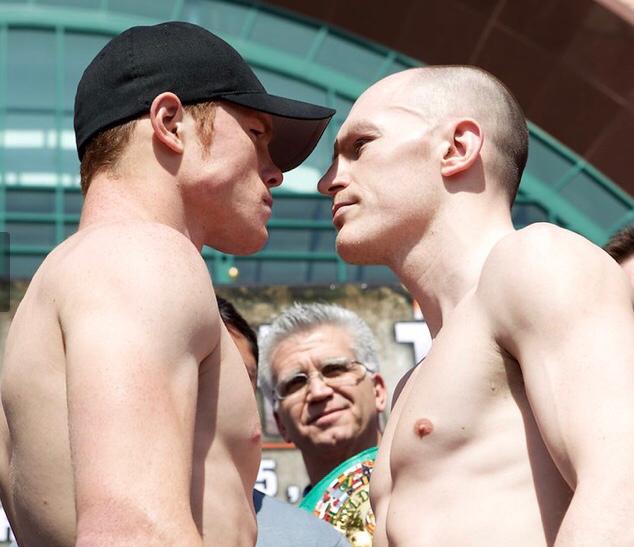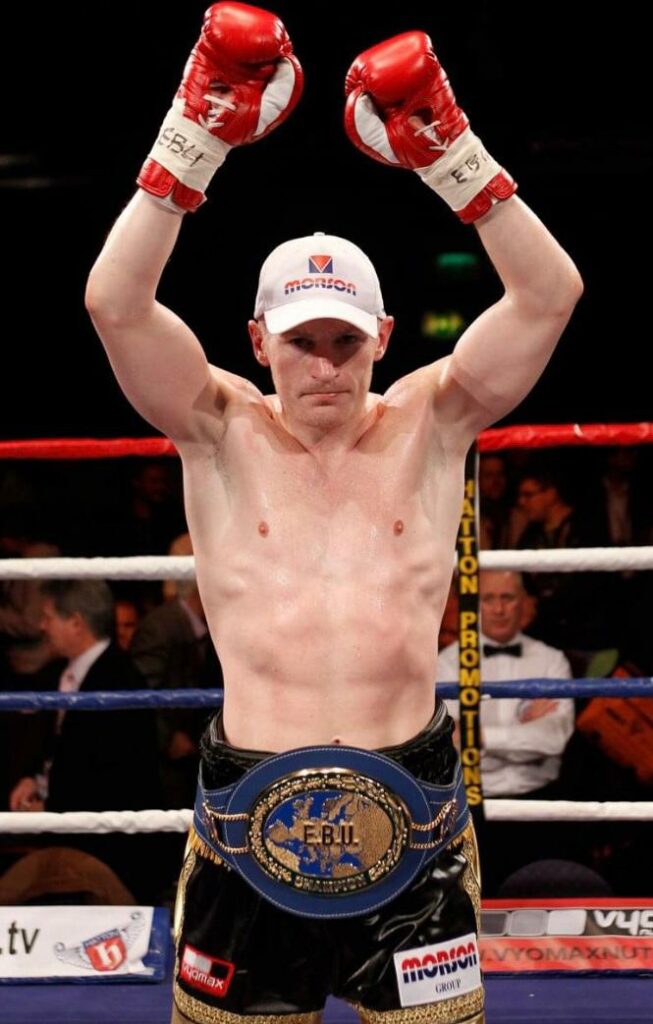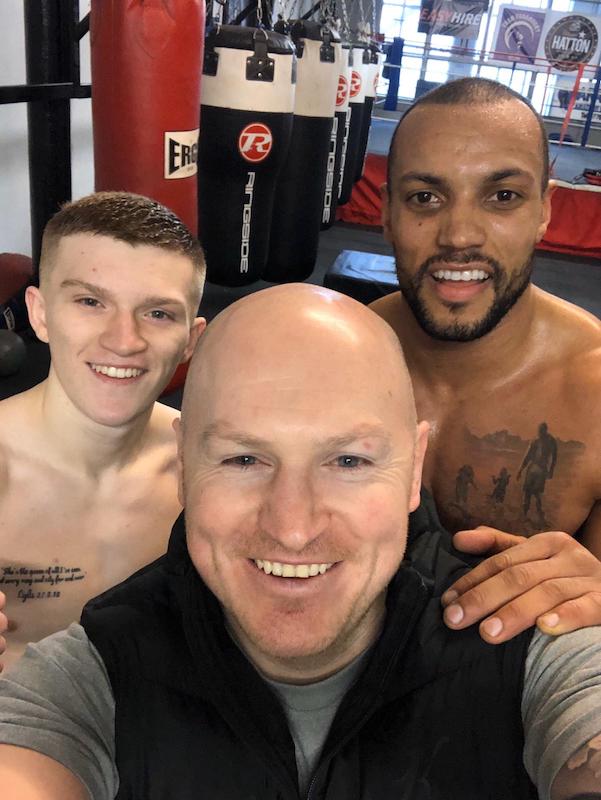It’s been over seven years since that long trip home from the Sandton Convention Centre, Johannesburg. The flight seemed to drag for Matthew Hatton (43-7-2, 17 KOs) and his team after suffering one, final defeat at the hands of fringe contender Chris van Heerden. The Stockport native knew, almost immediately, that his time as a professional fighter was up.
Retirement was a considered decision, Hatton told Boxing Social, after realising he was likely past his best days. He knew better than to battle on, having forged his own path after originally following in big brother Ricky’s footsteps. Matthew’s own 13-year professional tenure and continued success at European level paid tribute to his ability, but that last stand in South Africa couldn’t be ignored.
“I was in no doubt whatsoever – it was definitely the right time for me to stop,” admitted the younger of the successful siblings. “I know a lot of fighters do struggle when they finish with boxing, Ricky obviously being one of them. Even though I was fairly young when I retired, I’d already had 52 professional fights by that time. I’d had some hard fights as well.
“After my last fight in South Africa, I sat down and I had a think about it, and I wondered why I’d lost that fight. The honest answer was Chris van Heerden just wanted to win it more than me; he was hungrier than me, he was more ambitious than me. I had to be honest with myself.
“I got out at the right time. I’m still fit, I’m healthy, and I’m still involved in boxing now, so no, I don’t think I struggle with retirement – but I do miss fighting. I was boxing for a long time; I had a lot of fights. I don’t miss the day-to-day training and the dieting. Any sportsman, any fighter will tell you, they miss the week of the fight, that excitement. I look back on it and I had a good career; I was European champion, I fought for the world title and I fought some of the best out there.”
Before Matthew fought on television for major titles, before travelling to challenge the sport’s current PPV superstar in California’s Honda Center or topping the bill against a future world champion at Sheffield Arena, life was simpler in Cheshire. It all started with two brothers, both sports-mad and hoping to follow in the footsteps of their father Ray, a second-generation, ex-professional footballer who enjoyed a brief spell with Manchester City.

The Hattons weren’t necessarily bred with boxing in their blood. They dabbled with football and cricket before switching sports for the umpteenth time, eager to learn how to throw punches and defend themselves, competing as individuals.
Matthew, now aged 39, told me the boys “wanted for nothing” during those early days, backed by supportive parents who ran various drinking spots dotted across the city of Manchester. Matthew would eventually follow Ricky into kickboxing and the rest is history.
“As we touched on, I was always playing catch-up [with Ricky]. When the kickboxing gym shut, we progressed into boxing, but I was a little bit stop-start with it at first,” he said. “We had spent most of our early years in pubs. That’s what my mum and dad did, so I never lived in a house until I was 15. Then my dad got into carpets and both myself and Ricky left school; we started working with him for a bit. I was doing lots of different things at the time, but Ricky mainly concentrated on his boxing. I only had 22 amateur fights myself before turning professional, but we just had a good idea of the route we wanted to go down, and we both turned over fairly early.”
Hatton debuted aged 19, featuring at London’s York Hall on a card that was headlined by older brother Ricky (who made short work of Italian fighter, Giuseppe Lauri). Matthew would record a competent points victory over David White though admitted, with the benefit of hindsight, that he “should have stayed amateur a bit longer”. The fights would soon come thick and fast, with nine victories in his first 12 months as a professional.
His unbeaten streak was suddenly derailed after only two years, suffering a shock first defeat to journeyman David Kirk (LPTS6, September 2002) on a show at Manchester’s MEN Arena that featured familiar names such as Anthony Farnell, Michael Gomez, Eamonn Magee, Michael Jennings and Matthew Macklin. Ricky Hatton was quickly becoming British boxing’s poster boy, but his little brother was forced to rebuild and reconsider.
After a comeback victory over Paul Denton, Hatton’s potential was once again rocked with another loss to David Keir (LTKO4). “I felt there was big pressure on me when I turned professional and I didn’t really have that pedigree or the experience behind me,” Hatton explained. “I learned on the job. I lost fights and there was people writing me off early in my career. I took a few defeats early on. But to be fair, I always believed in myself and I was very determined and very stubborn.
“People were writing me off, saying I wouldn’t even go on to fight for a British title. Even when I was losing early on, I looked at it and I knew I was inexperienced. I knew I didn’t have the pedigree. But I knew if I stuck at it, I would eventually get to where I wanted to be. I always wanted to become a world champion, like most fighters. In the end, I just fell a little bit short of that.”
Various title opportunities were presented to Hatton in a career defined by a handful of big fights. He challenged unsuccessfully for the Commonwealth title (L12 Craig Watson in May 2008), but then surprised many two years later when capturing the European welterweight crown by soundly beating tough Italian favourite Gianluca Branco (W12) in March 2010.

It was an incredible journey for the man that many doubted and he remains extremely proud of his achievements. Hatton was never beaten for his blue EBU welterweight title, defending it twice before moving on. He would topple Ben Tackie (W10), defeat Ted Bami (WTKO6) and draw with Lovemore N’Dou (D12), further adding to a stellar resume while narrowly missing out on a showdown with Zab Judah through injury.
Sure, Ricky Hatton would lead a travelling army of 30,000 Brits to Las Vegas, but Matthew bounced back from early losses, becoming a household name on merit. He suffered expected disappointment when he challenged Mexican great ‘Canelo’ Alvarez for the WBC 154lbs title in 2011 (L12) and was comfortably beaten by Sheffield’s Kell Brook (L12) a year later.
“When people talk about my career, they want to talk about the Kell Brook fight and obviously the Alvarez fight, but definitely the best night for me was when I captured the European title against Gianluca Branco,” said Hatton. “He was a quality fighter and he’d only lost to Miguel Cotto and Arturo Gatti. That was a sweet moment for me, especially when people had said I wouldn’t achieve anything early in my career, I went on to win the European title. It was just a great moment.”
Matthew was in no doubt when asked about his toughest opposition. “Without a shadow of a doubt, [Canelo] Alvarez is definitely the best fighter that I’ve faced throughout my career. I felt great that night, I didn’t realise quite how good he was until I was in there with him,” he said. “Such an accomplished fighter at such an early age [Canelo was only 20-years old]. Very powerful and he was just unbelievably, very physically strong.
“It has been no surprise to me what he’s gone on to achieve in his career because I knew straight away. I knew after a couple of rounds, I was in with a special fighter. But Kell Brook was another really, really good fighter. They call him ‘The Special One’ and it’s true, he is a special fighter.”
‘Magic’ Matthew mentioned making peace with retirement from boxing, but it’s been another long road to prominence as a head trainer. Now, after hanging up his gloves, his days are spent in his Stockport gym holding pads for hot prospects. He’s looking for his own special fighter, currently working with beaten Ultimate Boxxer cruiserweight finalist Damian Chambers and his nephew, amateur prospect Campbell Hatton (son of Ricky Hatton – also acting as co-trainer).

“It’s exciting times,” he explained. “And I’m still as ambitious as a trainer and a manager as I was as a fighter. So I want to get to the very top. I fell just short of winning a world title myself, but that’s my ambition now as a trainer, to take a kid on through to a world title. That would be fantastic.
“Damian is an exciting fighter. He’s got a great work ethic, he’s a phenomenal puncher. He’s great to watch, so I think he’s definitely one to keep an eye on. And again, I know he’s part of the family, but I really do think in the next 12-18 months you’ll start to see young Campbell coming through and making a name for himself. We’re taking him all over the show, learning the game, and he’s coming along nicely.
“We could turn Campbell professional tomorrow if we wanted to, but when he turns pro we want him to make a real impact and he’s not quite there yet. But it’s not too far away and it’s something I’m really excited about,” continued Hatton. “Campbell is going to have that weight on his shoulders, being who he is. But again, it’s a double-edged sword [being a Hatton]. It’s going to open the door for some great opportunities for him. He’s had about 30 amateur bouts now, he’s 19-years old and he has got more of a professional style – it’s coming along nicely.”
If anybody had felt the effects of carrying the Hatton name from the shadows to the stage, it was Matthew. Always a half-step behind his older brother Ricky, he was forced to throw himself into challenging contests, establishing himself on the domestic, European and, eventually, the world stage. He never won a world title, but he remains the only Brit to have taken Canelo to the judges’ scorecards. He was his own fighter and remains his own man, maintaining his strong relationship with Ricky throughout.
Hatton wanted fans to know that he “had no quit in him” throughout his fighting career, desperate to provide entertainment in every outing. His love for the sport has never wavered; it was obvious when listening to him relive his greatest nights between the ropes. Passion, pride and purpose. While it could have been easy to turn his back on boxing after that first or second, painful defeat, it would have been just as easy to continue fighting, with injuries and mounting responsibilities into his early 30s.
Easy just wasn’t Hatton’s style.